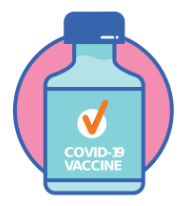COVID-19 Vaccination Information
Patient Information on the COVID-19 vaccination in autoimmune inflammatory rheumatic diseases (AIRD)
Please encourage your household members and other close contacts to have the COVID-19 vaccine, including the booster dose, once they are eligible as this may offer you further protection from getting COVID-19. This is known as the “ring” vaccination concept.
Click here for the latest vaccine advice and recommendations 2024
An Australian Government COVID vaccine fact checker is available.
A 2 page guide for your treating doctors can be found here. Please refer to the Australian Living Guidelines for the Pharmacological Management of Inflammatory Arthritis for more detailed information.
Why is it important for me to have the vaccine?
- Some diseases (including rheumatoid arthritis) are caused by the body’s immune system, which usually protects us from infection. When the immune system is affected by arthritis or medicines to treat the condition, the risk from COVID-19 may be increased.
- If you get vaccinated, you will be less likely to get COVID-19. Even if you do get COVID-19 when vaccinated, it is more likely to be a milder illness.
What vaccines are available?
XBB.1.5 vaccines are the preferred COVID-19 vaccines over other available vaccine types. The following COVID-19 vaccines are currently available in Australia:
Vaccines for children (5 years+)
- Comirnaty Omicron XBB.1.5 (Pfizer) 5 – 11 years
- Comirnaty Original (Pfizer) 5 – 11 years
- Comirnaty Original (Pfizer) 6 months – 4 years
Vaccines for adolescents and adults (12 years +)
- Comirnaty Omicron XBB.1.5 (Pfizer)
- Comirnaty bivalent Original/Omicron BA.4/5 (Pfizer)
- Spikevax Omicron XBB.1.5 (Moderna)
Talk with your doctor, pharmacist or vaccine provider to find out which COVID-19 vaccine is best for you.
For more information on COVID-19 vaccination in Australia, click here.
How many Covid-19 vaccines do I need?
- The number of vaccinations and booster doses you need depends on your age and whether you have a medical condition that increases the risk of severe COVID-19 illness.
- This recommended COVID-19 vaccines poster outlines the doses recommended for each age and population group.
- This ATAGI recommendation outlines the use of a 3rd primary dose of vaccine in individuals that are severely immunocompromised
How often should I have the COVID-19 vaccine??
- ATAGI recommends a dose of COVID-19 vaccine in the following population groups:
- Children (<5 years) – not recommended
- Children and adolescents (5-17 years) – can consider every 12 months in those with severe immunocompromise
- Adults (aged 18-64 years) – can consider a dose every 12 months, however in those with severe immunocompromise, recommended every 12 months and can consider every 6 months
- Adults (65-74 years) – recommended every 12 months and can consider a dose every 6 months
- Adults (≥75 years) – recommended every 6 months.
For further information, see: Australian Immunisation Handbook COVID-19 Chapter.
Will the medications I take for my condition effect the way the vaccine works?
- Some people who are taking medicines that suppress the immune system may be given advice to continue avoiding exposure to COVID-19 after they have had the vaccine. This is because their medications could mean their immune system doesn’t respond as strongly to the vaccine as people who don’t take these drugs.
- This does not mean you should stop your treatment, because this can result in a flare of your condition which puts you at greater risk from COVID-19.
- The timing and dosing of some medicines may also need to be individualised, if you are unsure, please speak to your treating rheumatologist for advice.
Can I have other vaccines (e.g. Influenza vaccine) at the same time as the Covid-19 vaccine?
Yes, the COVID-19 vaccine and the influenza (flu) vaccine can be safely given at the same time.
You do not need to delay your flu vaccine, in fact the COVID-19 vaccine does not protect against the flu, so it is important to still have your annual flu vaccine.
Do you still need the vaccine if you have had COVID-19?
Yes, people who have had COVID-19 should still be vaccinated with a COVID-19 vaccine. This provides extra protection against future infections. Wait for 6 months after COVID infection or previous dose of COVID vaccine before receiving a COVID-19 vaccine booster dose.
Further resources
- Australian Government COVID vaccine fact checker
- Information about booster vaccinations and how to book a vaccination appointment
- Information about getting your COVID-19 vaccination
- Additional COVID-19 resources for the general public (includes translated resources).
For Further information see the Australian Rheumatology Association Covid-19 Vaccination information sheet
Page reviewed and updated September 2024Discover more...
-
10 steps for living well with arthritis
Here is our 10 steps checklist to help you live with arthritis.
-
Children and arthritis
Arthritis can happen at any age. Here, you can find management and treatment information specifically created for the more than 6,000 Australian children living with...
-
Programs & Research
Arthritis Australia funds research and advocates to improve care, management, support and quality-of-life for people with arthritis.
Sign up to Arthritis Insights
Regular updates, news and research findings delivered to your inbox:
